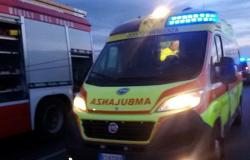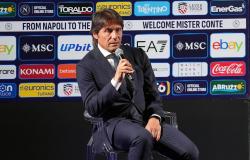“For me, death is an encounter with Jesus, it is paradise, it is the goal of our life”: this is how Don Antonio Biancotto spoke about death about ten days ago. In this interview published in the last issue of Gente Veneta (n. 22 of 31 May), Don Antonio – who passed away on Tuesday 4 June, shortly after midnight, at the Civil Hospital of Venice – spoke with serenity about the time of his illness and the comfort which comes from faith in Christ.
We propose it in his memory, but also as a testimony of courage and hope.
The funeral of Don Antonio Biancotto, presided over by Patriarch Francesco Moraglia, will be held on Monday 10 June at 11 am in the parish church of San Silvestro in Venice. At the end, Don Antonio’s body will be buried in the Portegrandi cemetery.
“I am calm, because death is only a passage and we are destined to contemplate the infinity of God. But to those who are well today I say: enjoy life, because life is beautiful.”
Don Antonio Biancotto responds from his hospital room in Venice. He is pleased to talk about the difficult moment he is experiencing: there is something to share even in the most dramatic moments, there is the truth of our condition to recognize and tell. And there is light even when it seems to many that night is about to begin.
Don Antonio, in this time of illness did you ask yourself “why me”?
No, if anything I said to myself: what a shame… I was in a phase of tiredness because I am 66 years old, but I thought I would have an autonomy of another ten years. “Why me?” I didn’t ask myself this also because – especially now that I’m in hospital – I find myself in contact with such fragile people, more fragile than me, that I don’t feel like asking myself, because they are worse off than me. It doesn’t come spontaneously to me…
What does the hospital experience with people in similar difficulty make you think?
Meanwhile it makes me feel very close to them, because we are in the same boat. And then it makes me think that before I was a healthy person who announced the Gospel, now I am a sick person who, among other sick people, tries to follow Jesus: which is not difficult, on the contrary, it helps you. So I share my anxieties and worries with them, they come to visit me in my room or I go and we share. I listen a lot to other sick people and it does me good to listen. And then I say a word of comfort, but with conviction, because I’m in it too, I don’t say words of circumstance. Do you want an example?
Please.
Today the Patriarch came. He talked to me about the future, he wanted to greet me, be close to me, pray with me… Then I said to him: do you want us to go into the next room and say hello to a mother who has three girls and blesses her? Because I am 66 years old, I am free and yet I still want to get well; but she who has family and ties even more. Maybe he encourages her. We went and it was a very touching moment: I see that my illness makes me be among others in a different way, encouraging these meetings. The lady was moved and her husband thanked her. It makes me so happy. It is a little good that we exchange between sick people.
Has your view of the passing of time changed? And the value of things?
Much. Until some time ago I was in a precarious situation, phase one, but now I have moved on to phase two. Better to call things by their name. Phase one is the fight against the disease through immunotherapy and other drugs: the doctors have done what they could, but now I have entered the phase of palliative medicine, of containment of the disease, no longer of battle. And I hope it works: I’ve seen many who have been given three months to live and who are still there years later…
How are you experiencing this phase?
Like a spoliation. That is, I have to strip myself of certain tasks and roles that I had before. But I feel a little free. I feel the phrases that Jesus says to Peter are mine: “another will dress you and take you where you don’t want to go.” Well, today it’s a bit like that for me. For example: I can no longer carry out personal cleaning tasks. But I found in the hospital chaplaincy, in Don Gianpiero Giromella and in his team, important material and spiritual support for me. In particular, one person from the team, a former nurse, shaves me, washes me where I can’t… This is dispossession, I have to depend on others. But he does it with love, with care…
But is spoliation more of a humiliation or a comfort?
A comfort. The Lord is teaching me, he makes me go to the essentials. It is not a humiliation, I am in the hands of the Lord, I am free now. What do you want me to defend now? So I’m at peace. Of course, some moments of fatigue, like last night, put me in difficulty and I pray to the Lord to free me from the evil, from the side effects and also from the great evil that is the tumor.
What do you think about death today?
I confront death, which I have preached many times. For me, death is an encounter with Jesus, it is paradise, it is the goal of our life. The only thing that scares me is the suffering before I get there. The pain before yes, that scares me. But with palliative medicine we can move forward.
Is his physical suffering bearable today?
Yes, the suffering is bearable for now. And therefore I trust in palliative medicine, especially if I were to get worse.
How has your faith changed – if it has changed – during this period?
I feel the Lord very close, very close: he is with me, inside me, he suffers with me. Then, seeing so many people, the parishioners who, for example, make a pilgrimage to Salute to ask for a grace for me, I find comfort. Many would also like to come and visit me but I can’t receive them because I can’t breathe. For me it is a delicate moment and sometimes I feel like saying: but why Lord?, no, enough, please…: a little rebellion would be born in my heart; But then I trust myself and peace returns to me. However, I understand those who rebel and those who are in difficulty because they are not animated by faith: I don’t know how they do it, I wouldn’t be able to face this disease humanly and psychologically on my own. What I notice is that my faith is becoming more and more essential. When someone is ill and has to leave the parish he really has to concentrate on what matters. And then I feel how important the Christian community is, which has also saved me in other situations. Jesus is the head of the body, it is He who acts. But his Church makes you feel close: for example, my brothers from the San Silvestro congregation came to visit me and I was very pleased. Then there are the many lay people… This gives me the perception of a body that is interested in the reality of a fragile member like I am now.
Do you have any regrets?
Yes. If I could go back I would like to be less intransigent within the company of Christ. The rule that those who are not against us are for us really applies; I, on the other hand, was a bit rigid about this. The regret is that sometimes I should have been more open to recognizing the good, wherever it came from and not necessarily from my circle. I regret having been too harsh.
That is: when you are sick you are more loving towards the world, is that right?
That’s how it is. I feel at ease with others. I have so many things to ask for forgiveness for… Illness makes you more capable of understanding. However, I am calm and I hope that the Lord will continue to support me physically and spiritually.
Material things, money, power… How has the illness changed your consideration of them?
If I didn’t hold them in high regard before, even less now. I remember that I have proposed several times that the basin and the towel be introduced in the installation rite of a new parish priest, so that the priest washes the feet of two representatives of the parish he is preparing to lead. It seems like a beautiful sign to me: it says the service you want to offer. And even all the honorific titles, which didn’t interest me before and now even less: let’s find other ways…, are legacies of the past.
If you had in front of you right now the young people of your parishes, or the male and female prisoners that you have been following as chaplain in Venetian prisons for 27 years, and who are in difficult conditions but certainly do not think about illness and death, what would you say? They?
To enjoy life: the sky, friendship, the sun, holidays, giving yourself to others, the joy of spending yourself, waiting for new skies and new lands. With joy of living inside: wow, we need it! Sometimes we are too focused on duty and that’s right, but come on, it’s also nice to rejoice. The pleasures of the table are also good: of course – I would tell them, don’t get drunk, don’t drink spritzes… – but enjoy the simple joys that the Lord gives us. Before her, a volunteer from Avapo came to me and she told me about her daughter that she has a great love for nature and animals. It’s a beautiful thing, I told her: ecology is to be enjoyed and built on, even before it is a topic to protest about. In short: love life and know that death is only a passage, because we are destined to contemplate the infinity of God. So life, life, life…
Do you have any moments of fear?
Physical pain scares me. And when the final moment comes, I hope that someone will be close to me and encourage me at the moment of my passing, that is, that they will pray with me, just as my parents taught me to do with my grandparents and elderly uncles, so we went to their bedside, we prayed with them and we knew that they would soon die. But there was an atmosphere of faith and familiarity. The passage of death is a little scary, but it is lighter if we are surrounded by people who encourage, who tell you “we are here, we love you, let’s make the passage together”…
Giorgio Malavasi







